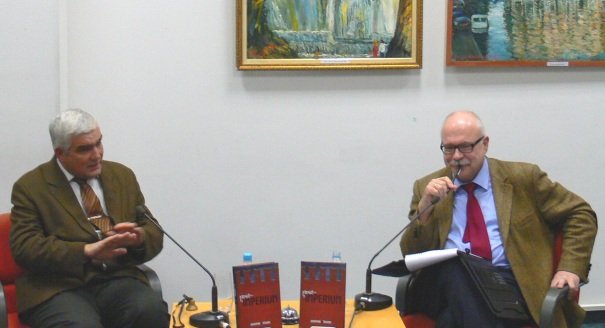Registration
You will receive an email confirming your registration.
IMGXYZ3723IMGZYXRussia has been in a post-empire state for the last 20 years. There is no way back to an empire now—Russia has passed the point of no return in this respect. Carnegie’s Dmitri Trenin addressed this issue during the presentation of the Russian edition of his book, Post-Imperium: A Eurasian Story, at a Carnegie Moscow Center event. Carnegie’s Andrei Ryabov moderated the discussion.
About Post-Imperium: A Eurasian Story
In Ryabov’s words, Post-Imperium: A Eurasian Story is a non-traditional presentation of Russia’s foreign policy over the 20 years. The book was titled Post-Imperium because, to use Trenin’s terminology, Russia is today in a post-imperial—or post-empire—state. This applies not only to its foreign policy, but to its entire society, Ryabov explained. Seen in this context, he noted, Russia’s foreign policy, with its various failures, is more or less in keeping with the particular group of interests behind it.
The Post-Imperial State
- Russia Is Not Unique: Trenin noted that various countries have entered the post-imperial state at various times in history. Some of them, like Britain and France, parted with their empires much earlier than Russia, have still not left the post-empire state behind completely. Russia is thus a specific, but not unique, case.
- 20 Years of Post-Empire State: After 400 years of being an empire, the post-empire state is something new for Russia, Trenin said. Until 1991, Russia thought of itself in imperial terms, and even after 1991 this thinking continued by inertia, until the country transformed into a post-empire state. This state has now become more stable and long-term after 20 years living in the new reality. The point of no return has been passed now and there is no way back to empire again, Trenin said.
Internal Problems: the Empire’s Legacy
- Ethnic Russians and the North Caucasus: Trenin noted that 80 percent of Russia’s population is ethnic Russian and Orthodoxy is the dominant religion. Many of the non-ethnic Russian peoples living in Russia have become russified. Seen in this context, the North Caucasus is essentially an enclave within Russia—a legacy of the empire days. Trenin noted that, among the North Caucasus republics, Chechnya is a specific case—a state bound to the Russian Federation by the personal union between Chechen leader Ramzan Kadyrov and Vladimir Putin.
- A Nation of Citizens: Russia has experienced an upsurge in ethnic nationalism over the last years. Trenin said that resolving this ethnic nationalism problem will be impossible without first building a nation of citizens. The recent political protests in Russia, in Trenin’s view, are the first signs that such a new civic nation is emerging: people are no longer content to live only for themselves and their own little world, but want to take part in the country’s life. If this process is encouraged and continues, the development of a nation of citizens will help Russia address its imperial legacy and take the country out of the post-empire state into a new phase of development.
Post-Empire Policy in the Post-Soviet Area
Trenin spoke about the way that the post-empire reality influences Russia’s policy in the post-Soviet area.
- Empire and Integration: In Trenin’s view, there is a big difference between an empire and integration. They are different in nature, aims, and the mechanisms by which they function. Russia’s internal resources are not sufficient to allow it to create something akin to an empire once more, but integration in the post-Soviet area may nonetheless be realized.
- The Failure of Integration after the Soviet Collapse: The main reason for the post-Soviet countries’ failure to integrate after the Soviet collapse was independent Russia’s policy, which was not genuinely interested in integration and did not want to share sovereignty in any way or become a donor with regard to anyone else. This is typical of the post-empire state, Trenin said: countries may declare a need for integration, but they fail to follow up their declarations with real acts.
- Integration Within the Eurasian Union: However, in Trenin’s view, close economic integration in the post-Soviet area has now become a real and vital demand. It can be carried out within the Eurasian Union, which has the potential to become a successful project if it manages to meet its members’ demands. If this project goes ahead, Russia will gain access to Kazakhstani resources and Belarusian labor, and Belarus and Kazakhstan will gain access to the Russian market, which is of considerable economic value to them. At the same time, Trenin noted, the Eurasian Union members are unlikely to go beyond economic union and freedom of movement between themselves to pursue some form of political integration.
Russia on the International Stage
- Failures in Relations with the West: Trenin noted that after the Soviet collapse, Russia wanted to become the world’s second big power and join the community of the Western states as an elder brother, first among other U.S. partners. Boris Yeltsin, Russia’s first president, had the idea of making Russia part of the West, and in 2001-2002 then-new president Vladimir Putin also made moves in the West’s direction. However, these attempts failed, and since 2004-2005, Russia has been sailing alone, having failed to integrate anyone else into itself or to integrate itself into any other group.
- Russia Has to Find Its Own Place: Trenin said that Russia is one of the few countries (along with the United States, China, and India) that can make independent strategic decisions. But Russia has still not struck the balance yet in its relations with the rest of the world. Finding this balance will require serious changes in Russia itself. Above all, Trenin said, Russia should position itself as, first, a European country, and second, a Euro-Pacific country.
